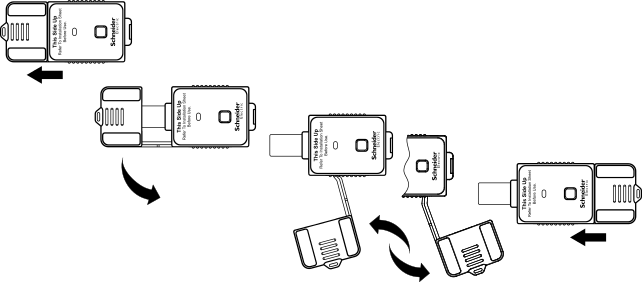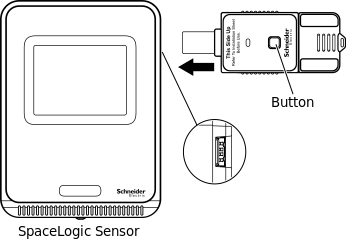The SpaceLogic Bluetooth Adapter is plugged into a SpaceLogic Sensor to provide a wireless Bluetooth connection to the BACnet/IP controller (Sensor Bus compliant controller) for commissioning, maintenance, and troubleshooting of the controller and the sensor.
|
Notice
|
|
SPACELOGIC SENSOR OR OTHER EQUIPMENT DAMAGE
Failure to follow these instructions can result in equipment damage.
|
action_zoom_plus_stroke

Figure:
SpaceLogic Bluetooth Adapter provides Bluetooth access to BACnet/IP controllers
The SpaceLogic Bluetooth Adapter provides a bridge between a Bluetooth enabled mobile device running the Commission mobile application and the Sensor Bus on the BACnet/IP controller. The Commission mobile application is used to perform commissioning, flow balance, and checkout operations on BACnet/IP controllers.
For more information, see Commission Mobile Application Overview
.
The SpaceLogic Bluetooth adapter is designed to be connected to a SpaceLogic Sensor.
The SpaceLogic Sensor is in turn is connected to the BACnet/IP controller:
On an MP controller, the SpaceLogic Sensor is connected to the RS-485 Com A port.
By default, the MP controller RS-485 Com A port is configured for the sensor bus.
For more information, see Communication Ports on MP-C-15A, -18A, -18B, -24A, and -36A
.For more information, see MP-V Communication Ports
.
On an RP controller, the SpaceLogic Sensor is connected to the RS-485 port configured for the sensor bus.
By default, the RP controller RS-485 Com A port is configured for the sensor bus.
For more information, see RP-C Communication Ports
.For more information, see RP-V Communication Ports
.
Note:
The labeling of the RS-485 port differs between different versions of the MP-C controller models. In previous versions, the port is labeled “Sensor Bus”.
Note:
The labeling of the RS-485 port differs between different hardware versions of the MP-V controller models. In previous versions, the port is labeled “Sensor Bus”.
For more information, see Differences Between MP-V Hardware Versions
.
The SpaceLogic Bluetooth adapter cannot be connected directly to the port on the BACnet/IP controller.
For more information, see MP-C Sensor Bus
.For more information, see MP-V Sensor Bus
.For more information, see RP-C Sensor Bus
.For more information, see RP-V Sensor Bus
.
The SpaceLogic Bluetooth adapter is plugged into a connector on the upper-right side of the SpaceLogic Sensor.
For more information, see Installing SpaceLogic Bluetooth Adapter on a SpaceLogic Sensor
. The physical connector on the sensor is a USB style connector, but the electrical interface and communication protocol are not USB. The SpaceLogic Bluetooth adapter communicates with the Bacnet/IP controller over the Sensor Bus using the RS-485 physical layer.
The SpaceLogic Bluetooth adapter PCB has a card-edge connector that protrudes from the PCB and mates with the SpaceLogic Sensor connector.
The SpaceLogic Bluetooth adapter is powered by the SpaceLogic Sensor, which also provides transient protection to the adapter.
The SpaceLogic Bluetooth adapter is housed in a plastic enclosure, which has a protective cap to help protect the PCB card edge when the adapter is not connected to a SpaceLogic Sensor. The protective cap has a hinge mechanism. The cap can either hang down, or rotate to the back end and snap on, when the adapter is connected to a SpaceLogic Sensor. The adapter is delivered with a lanyard that can be attached to a loop on the protective cap.
For more information, see Attaching a Lanyard to SpaceLogic Bluetooth Adapter
.
action_zoom_plus_stroke

Figure:
SpaceLogic Bluetooth Adapter
The SpaceLogic Bluetooth adapter has a momentary push-button switch that is used for pairing the adapter with a mobile device running the Commission mobile application.
For more information, see Connecting to a Controller with the SpaceLogic Bluetooth Adapter
.The SpaceLogic Bluetooth adapter sends out a unique signal that enables the mobile device to pair with the correct adapter. A blue indicator LED on the adapter indicates the status.
Table: SpaceLogic Bluetooth Adapter LED Patterns
|
LED Patterns
|
Condition/Mode
|
|
Blue, flashing (2 s ON, 8 s OFF)
|
Default Mode (No Bluetooth client connection, no BACnet/IP controller connection)
|
|
Blue, flashing (1 s ON, 1 s OFF)
|
Advertising Mode (No Bluetooth client connection, no BACnet/IP controller connection, connection is possible)
|
|
Blue, constant (always ON)
|
Connected Mode (Bluetooth client connection, no BACnet/IP controller connection)
|
|
Blue, ON when transmitting, OFF otherwise
|
Active Mode (Bluetooth client connection, BACnet/IP controller connection active)
|
|
Blue, flashing (2 s ON, 6 s OFF, 8 s ON, 4 s OFF)
|
DFU Mode (Waiting for user to press and hold push-button)
|
Specifications
|
| Electrical |
DC input power consumption
|
Maximum 0.25 W
|
DC input supply voltage
|
5.0 to 5.5 VDC (powered by the SpaceLogic Sensor)
|
| Communications |
Wireless communications
|
Bluetooth
®
4.2 Low Energy compliant
|
|
|
Bluetooth
®
5 Advertising
|
|
|
Frequency: 2.4 GHz
|
|
|
Line-of-sight range: max. 50 m (164 ft)
|
SpaceLogic communications
|
RS-485, proprietary Sensor Bus protocol
|
| Operation environment |
Ambient temperature, operating
|
0 to 50 °C (32 to 122 °F)
|
Ambient temperature, storage
|
-40 to +70 °C (-40 to +158 °F)
|
Humidity
|
Maximum 95 % RH non-condensing
|
| Mechanical |
Dimensions
|
70 W x 32 H x 12 D mm (2.8 W x 1.3 H x 0.5 D in.)
|
Weight
|
0.02 kg (0.05 lb) with lanyard
|
| Hardware |
CPU type
|
ARM Cortex-M4 single-core
|
Frequency
|
38.4 MHz
|
SRAM (embedded)
|
32 KB
|
Flash memory (embedded)
|
256 KB
|
Flash memory (serial)
|
1 MB
|
Status indicator
|
LED (blue)
|
Button
|
Momentary push-button switch
|

 Note:
Note: Note:
Note: SpaceLogic Bluetooth Adapter
SpaceLogic Bluetooth Adapter
 Attaching a Lanyard to SpaceLogic Bluetooth Adapter
Attaching a Lanyard to SpaceLogic Bluetooth Adapter
 Connecting to a Controller with the SpaceLogic Bluetooth Adapter
Connecting to a Controller with the SpaceLogic Bluetooth Adapter

